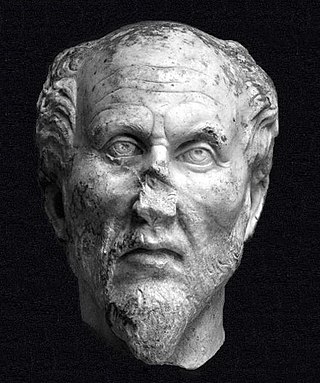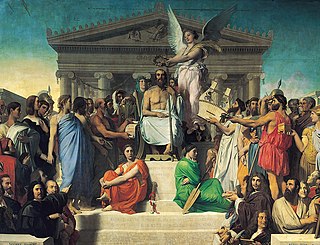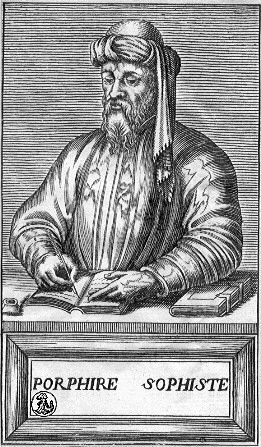Related Research Articles
Ammonius Saccas was a Hellenistic Platonist self-taught philosopher from Alexandria, generally regarded as the precursor of Neoplatonism and/or one of its founders. He is mainly known as the teacher of Plotinus, whom he taught from 232 to 242. He was undoubtedly the biggest influence on Plotinus in his development of Neoplatonism, although little is known about his own philosophical views. Later Christian writers stated that Ammonius was a Christian, but it is now generally assumed that there was a different Ammonius of Alexandria who wrote biblical texts.

Apuleius was a Numidian Latin-language prose writer, Platonist philosopher and rhetorician. He was born in the Roman province of Numidia, in the Berber city of Madauros, modern-day M'Daourouch, Algeria. He studied Platonism in Athens, travelled to Italy, Asia Minor, and Egypt, and was an initiate in several cults or mysteries. The most famous incident in his life was when he was accused of using magic to gain the attentions of a wealthy widow. He declaimed and then distributed his own defense before the proconsul and a court of magistrates convened in Sabratha, near Oea. This is known as the Apologia.
In the Platonic, Neopythagorean, Middle Platonic, and Neoplatonic schools of philosophy, the demiurge is an artisan-like figure responsible for fashioning and maintaining the physical universe. The Gnostics adopted the term demiurge. Although a fashioner, the demiurge is not necessarily the same as the creator figure in the monotheistic sense, because the demiurge itself and the material from which the demiurge fashions the universe are both considered consequences of something else. Depending on the system, they may be considered either uncreated and eternal or the product of some other entity.

Plato was an ancient Greek philosopher born in Athens during the Classical period in Ancient Greece. In Athens, Plato founded the Academy, a philosophical school where he taught the philosophical doctrines that would later become known as Platonism. Plato was a pen name derived, apparently, from the nickname given to him by his wrestling coach – allegedly a reference to his physical broadness. According to Alexander of Miletus quoted by Diogenes of Sinope his actual name was Aristocles, son of Ariston, of the deme Collytus.

Plotinus was a Hellenistic Platonist philosopher, born and raised in Roman Egypt. Plotinus is regarded by modern scholarship as the founder of Neoplatonism. His teacher was the self-taught philosopher Ammonius Saccas, who belonged to the Platonic tradition. Historians of the 19th century invented the term "neoplatonism" and applied it to refer to Plotinus and his philosophy, which was vastly influential during Late Antiquity, the Middle Ages, and the Renaissance. Much of the biographical information about Plotinus comes from Porphyry's preface to his edition of Plotinus' most notable literary work, The Enneads. In his metaphysical writings, Plotinus described three fundamental principles: the One, the Intellect, and the Soul. His works have inspired centuries of Pagan, Jewish, Christian, Gnostic, and early Islamic metaphysicians and mystics, including developing precepts that influence mainstream theological concepts within religions, such as his work on duality of the One in two metaphysical states.

Cassius Longinus was a Greek rhetorician and philosophical critic. Born in either Emesa or Athens, he studied at Alexandria under Ammonius Saccas and Origen the Pagan, and taught for thirty years in Athens, one of his pupils being Porphyry. Longinus did not embrace the Neoplatonism then being developed by Plotinus, but continued as a Platonist of the old type and his reputation as a literary critic was immense. During a visit to the east, he became a teacher, and subsequently chief counsellor to Zenobia, queen of Palmyra. It was by his advice that she endeavoured to regain her independence from Rome. Emperor Aurelian, however, crushed the revolt, and Longinus was executed.

Porphyry of Tyre was a Neoplatonic philosopher born in Tyre, Roman Phoenicia during Roman rule. He edited and published The Enneads, the only collection of the work of Plotinus, his teacher.

Thomas Taylor was an English translator and Neoplatonist, the first to translate into English the complete works of Aristotle and of Plato, as well as the Orphic fragments.
Middle Platonism is the modern name given to a stage in the development of Platonic philosophy, lasting from about 90 BC – when Antiochus of Ascalon rejected the scepticism of the new Academy – until the development of neoplatonism under Plotinus in the 3rd century. Middle Platonism absorbed many doctrines from the rival Peripatetic and Stoic schools. The pre-eminent philosopher in this period, Plutarch, defended the freedom of the will and the immortality of the soul. He sought to show that God, in creating the world, had transformed matter, as the receptacle of evil, into the divine soul of the world, where it continued to operate as the source of all evil. God is a transcendent being, who operates through divine intermediaries, which are the gods and daemons of popular religion. Numenius of Apamea combined Platonism with neopythagoreanism and other eastern philosophies, in a move which would prefigure the development of neoplatonism.
Moderatus of Gades was a Greek philosopher of the Neopythagorean school, who lived in the 1st century AD. He was a contemporary of Apollonius of Tyana. He wrote a great work on the doctrines of the Pythagoreans, and tried to show that the successors of Pythagoras had made no additions to the views of their founder, but had merely borrowed and altered the phraseology.

Platonism is the philosophy of Plato and philosophical systems closely derived from it, though contemporary Platonists do not necessarily accept all doctrines of Plato. Platonism had a profound effect on Western thought. In its most basic fundamentals, Platonism affirms the existence of abstract objects, which are asserted to exist in a third realm distinct from both the sensible external world and from the internal world of consciousness, and is the opposite of nominalism. This can apply to properties, types, propositions, meanings, numbers, sets, truth values, and so on. Philosophers who affirm the existence of abstract objects are sometimes called Platonists; those who deny their existence are sometimes called nominalists. The terms "Platonism" and "nominalism" also have established senses in the history of philosophy. They denote positions that have little to do with the modern notion of an abstract object.
Numenius of Apamea was a Greek philosopher, who lived in Apamea in Syria and Rome, and flourished during the latter half of the 2nd century AD. He was a Neopythagorean and forerunner of the Neoplatonists.
Gnosticism refers to a collection of religious groups originating in Jewish religiosity in Alexandria in the first few centuries AD. Neoplatonism is a school of Hellenistic philosophy that took shape in the 3rd century, based on the teachings of Plato and some of his early followers. While Gnosticism was influenced by Middle Platonism, neoplatonists from the third century onward rejected Gnosticism. Nevertheless, Alexander J. Mazur argues that many neoplatonic concepts and ideas are ultimately derived from Sethian Gnosticism during the third century in Lower Egypt, and that Plotinus himself may have been a Gnostic before nominally distancing himself from the movement.
Atticus was an ancient Platonic philosopher who lived in the second century of the Christian era, under the emperor Marcus Aurelius. His lifetime fell into the epoch of Middle Platonism, of which he was one of the most notable representatives.
Dexippus was an Ancient Greek Neoplatonist philosopher from the 4th century AD, whose wrote a commentary on the Categories of Aristotle which is partially extant.
John Myles Dillon is an Irish classicist and philosopher who was Regius Professor of Greek in Trinity College, Dublin between 1980 and 2006. Prior to that he taught at the University of California, Berkeley. He was elected a corresponding member of the Academy of Athens on 15 June 2010. Dillon's area of research lies in the history of Platonism from the Old Academy to the Renaissance, and also Early Christianity.
Neoplatonism was a major influence on Christian theology throughout Late Antiquity and the Middle Ages in the West. This was due to St. Augustine of Hippo, who was influenced by the early neoplatonists Plotinus and Porphyry, as well as the works of the Christian writer Pseudo-Dionysius the Areopagite, who was influenced by later neoplatonists, such as Proclus and Damascius.
Platonism, especially in its Neoplatonist form, underwent a revival in the Renaissance as part of a general revival of interest in classical antiquity. Interest in Platonism was especially strong in Florence under the Medici.
Origen the Pagan was a Platonist philosopher who lived in Alexandria. He was a student of Ammonius Saccas and a contemporary of Plotinus in Ammonius's philosophy school in Alexandria. Some researchers posit that this Origen is the very same famous Christian philosopher and theologian Origen of Alexandria, who was educated by Ammonius Saccas. The pagan philosopher is sometimes referred to as Origenes to distinguish him more easily from the Christian Origen.
Neoplatonism is a version of Platonic philosophy that emerged in the 3rd century AD against the background of Hellenistic philosophy and religion. The term does not encapsulate a set of ideas as much as a series of thinkers. Among the common ideas it maintains is monism, the doctrine that all of reality can be derived from a single principle, "the One".
References
- Armstrong, A. H. (April 1967). The Cambridge History of Later Greek and Early Medieval Philosophy. Cambridge University Press. ISBN 978-0-521-04054-9 . Retrieved 16 April 2023.
- Dillon, John (28 October 1993). Alcinous: The Handbook of Platonism. Clarendon Press. ISBN 978-0-19-159113-6 . Retrieved 16 April 2023.
- Dillon, John M. (1996). The Middle Platonists, 80 B.C. to A.D. 220. Cornell University Press. ISBN 978-0-8014-8316-5 . Retrieved 20 February 2023.
- Sandy, Gerald N. (1997). The Greek World of Apuleius: Apuleius and the Second Sophistic. Brill. ISBN 978-90-04-10821-9 . Retrieved 16 April 2023.
- Reale, Giovanni (1 January 1990). A History of Ancient Philosophy IV: The Schools of the Imperial Age. SUNY Press. ISBN 978-0-7914-0128-6 . Retrieved 16 April 2023.